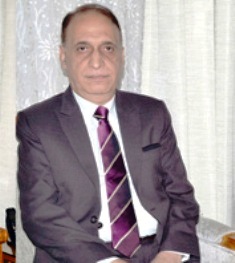Bestowing the status of Schedule Tribe to Phari Speaking people is their right and undoubtedly they deserve it
By A A Latief U Zaman Deva
Nothing wrong in debating issues by advancing arguments for & against but ought to be rancor free & sans vituperative diction.
The Gujjar & Bakerwalls ( GB) are the last community settlers in JK & therefore their abodes in mountainous & tough terrains resulting in their geographical isolation & retention of primitive traits which twin planks are attributable for their extreme backwardness: social, political outreach, economic & educational & further compounded by quite negligible stakes in proprietary land holdings and other areas like services & manufacturing with exceptional position in sub mountainous & plain Jammu due to historic proximity to undivided Punjab and other northern commercial areas.

The likelihood of debacle in Kashmir, beginning prominently in 1989, preceded by crisis in Leh prompted Govt of India( GOI) to adopt the recommendations of the State Govtt, otherwise pending consideration since 1983,by bestowing the status of Schedule tribe on tribals in the year 1989 which they undoubtedly deserved. The participatory role in socio- economic development of JK for GB has matured due to this epoch making constitutional safeguard but chronic poverty and abysmal educational status of the community in Kashmir Valley and Chenab Valley has precluded them from marching hand in hand with their community members from other regions for which the local leadership in the two regions is also responsible who seldom involved themselves in missionary mode to transform their miserable plight. High time for focussed attention towards the community in these two neglected regions. Before down grading of the State into two Union territories, the percentage of ST population in Jammu, Kashmir & Ladakh Divisions was 54+,31+ &14+ respectively but in direct recruitment for State cadre posts almost 30% selectees would be from Ladakh owing to high order in comparative merit attained by them as a result of exposure to leading national educational institutions. Against 500 odd State cadre selections against ‘ST quota during last over 05 years none has qualified from the GB community of the most backward two regions except 01 from Kangan which portrays the poor developmental indices of the inhabitants of the identified geographical areas of concern. The outcome of intra category competition with Ladakhis numbering 2.18 lakhs seems to haunt the GB community in the debate about demand for ST status to Pahari community comprising 9% of UT population who on the basis of relevant economic indicators are ahead of GBs. The former shall get ST status sooner or later for plausible reasons including geo-strategic & opposition to it can at best delay the process. Advisable would be to address the genuine apprehensions of GBs by forging mutual understanding of respective interests instead of degrading the contours of debate on parameters applicable to reservation for SCs whose case hinges on isolation as a result of religiously ”subjugated low caste status” sanctified in the religious scriptures and ”stigma” perpetuated eternally notwithstanding upward movement in the socio-economic ladder which by no stretch of imagination can be applied to GBs.
With a view to percolate down the benefits of reservations in favour of hitherto uncovered/ minimally covered castes in OBCs the 27% quota is being distributed intra OBC category by GOI once degree of backwardness quantified on the basis of socio-economic analysis.The same paradigm on application to JK can stipulate division of 19% ST reservation between Paharies and non- Paharies @ 09 & 10 % respectively. However the unfolding of factum about definition of a ” Pahari” fulfilling the ethnic and linguistic requirements is called for as in its absence the Koshur, Dogri & Punjabi speaking population in Peer Panchal have registered Pahari as their mother tongue in records of Census 2011 which may lead to ungenuine demands by non ST& SC people living in Chenab Valley , Distt Reasi & areas contiguous with Pahari Basties in Kashmir Division for inclusion in Pahari category. The non clarity as to who is a Pahari has propped up false expectations amongst non ethnic Paharies on the strength of sharing the common topography and habitat. The sooner it is done the better even as it may entail reduction in % of Pahari language speaking population.
Almost all stakeholders are adherents of faith, laying importance to maintenance of civility in human relations between tribes and nations, which is continuum of the arrival of Prophet Adam some 120000 to 156000 years ago & therefore desirability for debate for sustainable outcomes in pursuit of peace and tranquility for the mankind.

